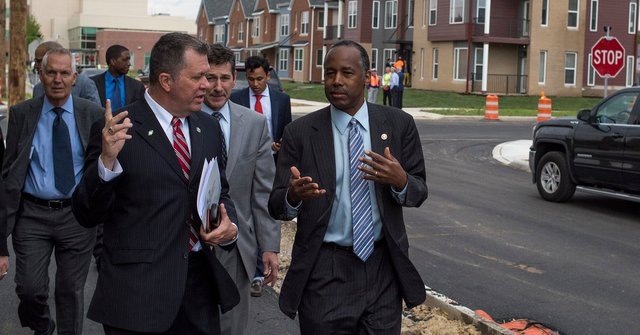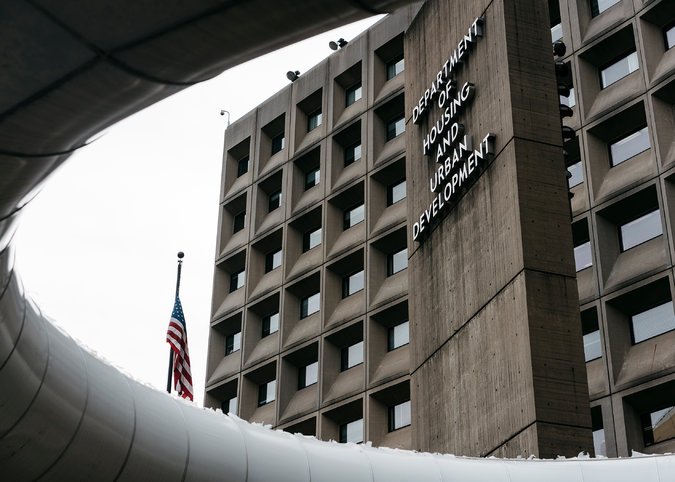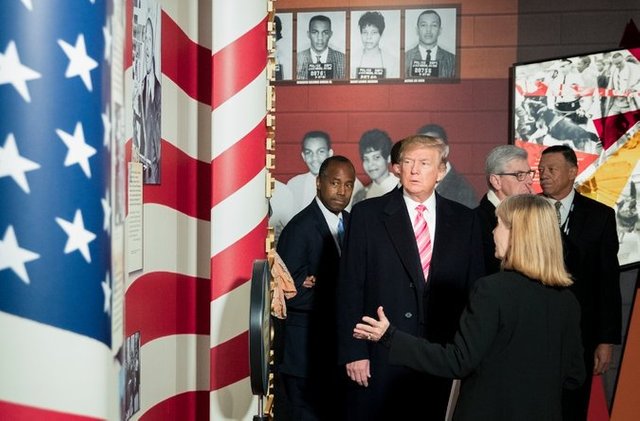Ben Carson on His Vexing Reign at HUD: Brain Surgery Was Easier Than This

WASHINGTON — Before Ben Carson accepted President Trump’s offer to become secretary of housing and urban development, a friend implored him to turn down the job to preserve the reputation he had earned as a brilliant neurosurgeon and lost, in part, as a politician.
The confidant, Logan Delany Jr., who was the treasurer of Mr. Carson’s 2016 presidential campaign, described HUD as a “swamp” of “corruption.” He predicted in an email that Mr. Carson’s “lack of a background in housing” would make him prey to the department’s career staff and political appointees, as well as predatory lobbyists.
To drive home the point, Mr. Delany appended a link to an obituary of Samuel R. Pierce Jr., the Reagan-era HUD secretary whose reputation as a trailblazing black corporate lawyer was tarnished by accusations that he steered contracts to Republican cronies.
Mr. Delany’s most dire prediction has not materialized. But many of the other problems outlined in the memo have come to pass during Mr. Carson’s first year running a sprawling $47-billion-a-year community development bureaucracy that provides rental subsidies for about five million families and oversees people living in 1.2 million units of public housing. And Mr. Carson’s own lapses in judgment — combined with the questionable behavior of his family and his reluctance to aggressively engage Mr. Trump — have left him at the margins of the cabinet.
Mr. Carson, people close to him said, has been whipsawed by a job he has found puzzling and frustrating — so much so that he considered quitting during recent wrangling over the department’s budget.
“There are more complexities here than in brain surgery,” Mr. Carson said in an interview last week. “Doing this job is going to be a very intricate process.”
Mr. Carson’s efforts to steer the agency toward programs that foster self-sufficiency, one of his stated goals, have been undermined by staffing mistakes, his indecisiveness and a president indifferent, at best, to the department’s mission of helping the poor, according to two dozen current and former HUD and administration officials.
All of this has been exacerbated by Mr. Carson’s tin ear for politics — such as the damaging disclosure that he had looked the other way when subordinates spent, at a time of savage budget cuts, $31,000 to buy him a new mahogany dining room suite for his office that included a pair of $1,000 side chairs.
“I think you have to come to the job with a sense of what the duties and responsibilities are,” said Representative Al Green, a Texas Democrat and frequent Carson critic. “If you don’t come with that sense, and the doctor didn’t, it doesn’t matter what your intentions are, you aren’t going to succeed. We are seeing that now.”
“Secretary Carson has to step up,” said Senator Kirsten Gillibrand, Democrat of New York, who voted against his confirmation a year ago.
HUD, created in 1965 as a Great Society response to a growing urban crisis, is a lot less powerful than its vast portfolio suggests. It is mostly a conduit for congressional appropriations and a caretaker for a patch quilt of existing anti-poverty programs.
Mr. Carson accepted the job after an intense multiple-call-a-day barrage from Mr. Trump, who saw a chance to infuse HUD with the self-help philosophy that was the theme of Mr. Carson’s presidential campaign. His model is his own mother, a domestic worker who rescued her two sons from poverty, roach-infested apartments and the low expectations of their teachers.
But he has not yet been able to get serious buy-in from Mr. Trump or secure commitments from his staff on the programs he favors, especially his plan to create thousands of community centers geared toward fostering self-sufficiency. In part, this is because the president views him as a secondary player, a nice guy unlikely to make waves.
While Mr. Trump treats him with respect, he views him as a beta “winner,” not as a “killer,” the alpha in his organizational taxonomy, according to several White House officials.
That lack of influence was painfully apparent during the internal debate before the release of Mr. Trump’s budget, which would help pay for increases in military and Homeland Security spending with steep cuts to HUD’s Community Development Block Grant and core housing programs.

Mr. Carson, people close to him say, hates asking anybody for money — and has told advisers that he feels acutely uncomfortable asking the president for anything that could be construed as a favor.
When the White House budget director, Mick Mulvaney, proposed an 18 percent cut to HUD late last year, Mr. Carson reluctantly reached out to the president. Mr. Trump expressed sympathy. Then he told him to “talk to Mick” about the details.
Mr. Carson denies that he has been marginalized and says he backs Mr. Trump’s guns-before-butter budget approach. “I believe in what the president believes,” Mr. Carson said. “We are in a very precarious situation with North Korea, with radical terrorists who want to destroy us, with the Soviet Union, who has ambitions.” An aide later said he was referring to Russia.
In private, however, Mr. Carson has been profoundly frustrated, telling friends he would find it difficult to stay if deep cuts to two housing programs, focused on helping the elderly and the disabled, were enacted.
“He was ready to walk — he would have walked,” said Mr. Carson’s longtime business manager and political adviser, Armstrong Williams.
Eventually, Mr. Carson persuaded the White House chief of staff, John F. Kelly, and the president to restore about $2 billion for HUD’s budget. That dropped the total percentage cut to 14 percent. It was bad but better.
Raising his voice in defense of HUD doesn’t come naturally to the defiantly low-key Mr. Carson. That sotto voce serenity prompted Mr. Trump as a candidate to mock a favorite Carson anecdote about his troubled youth - the one in which a teenage “Bennie” Carson tried to stab a buddy, only to be stopped by a providentially thick belt buckle.
“How stupid are the people of the country to believe this crap?” Mr. Trump asked at a November 2015 rally.
Mr. Trump later apologized for his remarks, Mr. Carson has told associates, confessing to being “a little bit panicked” by the doctor’s early popularity.
Mr. Carson has, at times, and in a measured way, criticized Mr. Trump, mildly taking him to task for his profane description of Haiti and African countries in January. But he said he did not “spend a lot of time thinking about race, quite frankly,” when asked if he felt responsibility as the most prominent African-American in an overwhelmingly white administration.
Still, Mr. Carson said that he was trying to soften Mr. Trump’s tone. “I have moderated my own speech because I recognized that when I say things in an inflammatory manner, that’s not particularly helpful,” he said. “I have made it known to everyone in the administration, including the president.”
The power dynamic in the relationship, however, is clearly tilted. Mr. Trump shot down Mr. Carson’s choice for deputy secretary, Rick A. Lazio, a former Long Island congressman who savaged the president during the campaign.
At around the same time, the White House press office also rejected the secretary’s request to appear on CNN and then told him to clear all media appearances, much to Mr. Carson’s annoyance, aides said.
He often simply seems out of the loop — telling senior staff members at a gathering last spring that the president had given him assurances that HUD’s budget would not be cut at all.
Congressional Democrats have also proved to be a problem. Until she relented in late 2017, Senator Elizabeth Warren, a Massachusetts Democrat, blocked the confirmation of the eventual nominee for deputy secretary, and Ms. Warren continues to delay the confirmation of two other top housing officials.
People close to Mr. Carson have been prodding him to show more fight with the White House and Congress. “I like the aggressiveness! That’s a new secretary I haven’t seen!” Mr. Williams said after the secretary raised his voice during a televised town-hall-style meeting recently.

But that forcefulness has often been absent in his dealing with staff members. His first six months in office were marked by damaging infighting and the departure of dozens of experienced people.
Mr. Carson’s first chief of staff, Sheila Greenwood, a HUD veteran, clashed with Lynne Patton, a former officer with a charitable foundation run by Mr. Trump’s son Eric, who was given a top department job without any consultation with the secretary.
Their conflict came to a head when Ms. Greenwood rejected Ms. Patton’s request for an Amtrak ticket from Washington to New York, ordering her to take a shuttle flight at a cheaper contracted rate. Ms. Patton told associates she was offended, then paid for the train ticket out of pocket. To alleviate the tension, Mr. Carson arranged for Ms. Patton to be transferred to HUD’s New York City regional office, according to people with knowledge of the situation.
Mr. Carson complained about her behavior — and requested her apology this year when she called a White House reporter “Miss Piggy” on Twitter — but he has not taken more serious disciplinary action, and Ms. Patton still enjoys the protection of her friends in the White House.
To the consternation of some staff members, Mr. Carson has leaned heavily on his family, especially his wife, Candy — who occupied a space in Mr. Carson’s office suite for much of his first year in office, said a Carson confidant.
A former chief administrative officer in the department, Helen Goff Foster, has filed a complaint with the federal whistle-blower agency, the Office of Special Counsel, alleging that she was demoted and transferred after she refused Mrs. Carson’s request to circumvent a rule capping redecorating expenses for Mr. Carson's office to $5000.
The Carsons, through a HUD spokesman, denied her claim. But shortly after, someone in Mr. Carson’s office decided to pay a small Baltimore company $31,561 to replace his dining room table, chairs and hutch. The secretary did not know about the purchase, according to his spokesman, Raffi Williams. After the spokesman said last week that Mr. Carson had no plans to reverse the decision, Armstrong Williams said two days later that the secretary was trying to cancel the order.
Issues involving Ben Carson Jr., the secretary’s son and a Maryland-based businessman, have proven equally troublesome. Mr. Carson invited him to a Baltimore listening tour last summer, despite a warning from department lawyers, during one of his daily briefings, about a potential ethics problem.
In response to the lawyers, Mr. Carson summoned his son and his wife, a government contractor, to ask if they were doing anything wrong — then left the decision of whether they planned to attend up to them, according to two people with knowledge of the conversation. They did.
“I don’t have any problem with ethics,” Mr. Carson said. “Here is a rather unique situation, Ben is somebody who is integrally important to me, and wants to help. I’m not going to just say no because it looks this way or that way.”
He added, “We are ethically pure.”
Such questions, Mr. Carson believes, are a distraction from his grand vision of HUD as a ladder out of dependency for the working poor. Increasingly, he is staking that legacy on a single program, the so-called EnVision Centers project.
Over the next three to five years, Mr. Carson hopes to establish more than 3,000 of the centers to provide low-income families, especially young people, with one-stop access to educational, job training, mentorship and health care services. But Ms. Greenwood argued that Mr. Carson’s team was not experienced enough to make it work, and it soon became apparent that there was little appetite in the White House for more than a pittance in funding — $2 million over the next year.
In response, Mr. Carson has turned to charitable foundations for funding. But he has not proved to be the best pitchman, according to a dozen attendees at a January meeting with potential donors at HUD headquarters. He began with a libertarian lecture, extolling the genius of the 19th-century robber barons who created the country’s philanthropic charities. They had spared the country from “European socialism,” he said.
One skeptical foundation officer countered by asking the secretary where “the public” part of the public-private partnership was coming from. Another asked, “What does this have to do with public housing?”
But his audience, mainly composed of community development specialists who believe that the government has an enduring moral responsibility to help the poor, was most put off by Mr. Carson’s assertion that the goal of EnVision was to put HUD out of business.
“There is nothing wrong with encouraging safe, inviting places for youth to grow,” said Adrianne Todman, chief executive of the Washington-based National Association of Housing and Redevelopment Officials. “But it is time for us to focus on the ‘H’ in HUD — ‘housing.’”